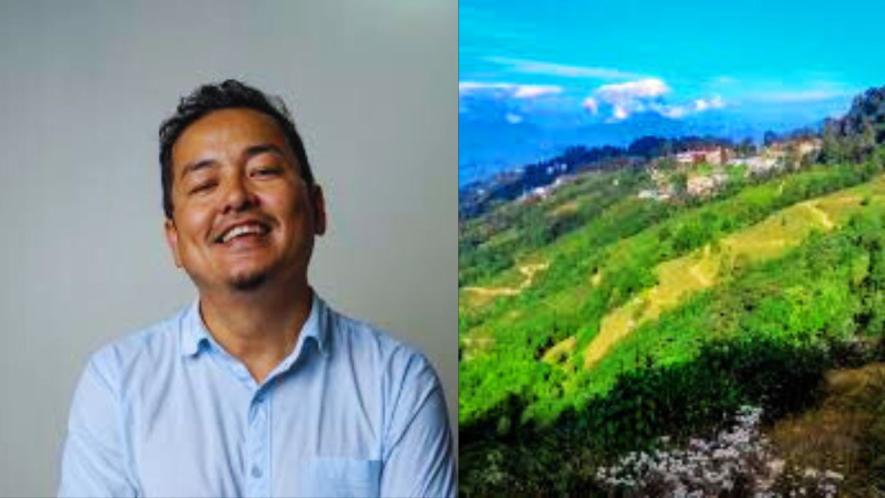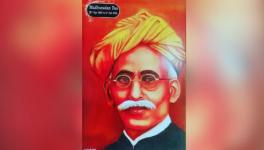Churn in Darjeeling Hill Politics; Test for Ajoy Edwards

Image Courtesy: Facebook
Kolkata: Politics in the Darjeeling hills, unusually quiet for the past few months, has been witnessing a churn in the past three weeks as politicians of various hues are shedding their current identity to join the Indian Gorkha Janshakti Front (IGJF), which was formally launched on December 22, 2024, by Ajoy Edwards, who dissolved his Hamro Party the previous day.
At the launch last month, presided over by a former IPS officer Norbu Tshering, Edwards declared that the new political outfit, being given shape to “fill a vacuum” in West Bengal’s hill politics, would have Gorkhaland as its vision and all-round development – vikas – of the hill people as its mission.
Edwards, 51, owner of Darjeeling’s 112-year-old well-known eatery Glenary’s, is seeking to widen his political base that he was able to create over three years ago when his Hamro Party was able to drub established political parties, such as Gorkha Janmukti Morcha (then backed by the ruling Trinamool Congress) and Bharatiya Janata Party-supported Gorkha National Liberation Front (GNLF) in the Darjeeling Municipal Elections held just three months after his party’s launch.
The Hamro Party had bagged 18 seats in the 32-member municipal board. Later, of course, in the uncertain hill politics in those times, Edwards’ party became a victim of defection. His party had also registered its presence in the Gorkha Territorial Administration (GTA) Sabha.
A fairly good number of experienced politicians of other political parties have since joined IGJF. Prominent among them are Mahendra Chhetri from GNLF, Nar Bahadur Khawash from TMC, a former deputy chief of GTA Pradeep Pradhan who was with GJM and Prakash Gurung, also from GJM.
Tshering, who presided over IGJF’s launch ceremony, is expected to rope in retired officials who are nursing political ambitions, informed quarters told NewsClick.
Asked about the reasons that prompted him to take a fresh plunge in hill politics and how soon he expected IGJF to begin political activity, Edwards told NewsClick that in about six-weeks the new party’s constitution, registration and political programme would be firmed up.
Right now, Edwards is acting as the chief convener and is being aided by the leaders who have joined him from other parties, who are also acting as conveners. Party base-building tasks have been assigned, for example, to Chhetri, Khawash and Pradhan, among others.
“We have lost some 40 years in pursuing agitational politics that invariably degenerated into prolonged violence that ruined the hill economy. A coordinated approach to develop the hill economy with the prime objective of bringing about a qualitative change in the lives of the people is the need of the hour and IGJF would precisely attempt that,” the chief convener said.
The established parties, particularly BJP and TMC, have fed people with promises for too long and people now doubt their intentions, he said, adding that a vacuum exists and IGJF aims to fill that and ensure a better deal for the people, who have been neglected and humiliated for a long time.
Significantly, even before completing party formation-related formalities, the new outfit has taken up with the state government its demand for grant of land rights (“as per physical possession”) to the indigenous Gorkha, adivasi, Rajbanshi and other communities of Darjeeling and Kalimpong districts and Terai and Dooars region.
In a memorandum to the West Bengal Chief Minister, IGJF has pointed out that the people of the mentioned areas, including those living in the tea gardens, cinchona plantations, DI (Darjeeling Improvement) Fund land and forest areas “have been inhabitants ... for long before India’s Independence. They are indigenous to this region and have ...profound cultural and historical connection” with the region.
IGJF has demanded that the people of the areas specified should be granted land rights; if warranted even by appropriate amendments to the West Bengal Land Reforms Act.
Informed political sources see in the memorandum a clever move to start political activity by raising the long-pending issue of land rights, which is a sensitive matter and has an immediate emotional connect with the people.
IGJF also proposes to take up the issue of minimum wage for tea garden and cinchona plantation workers with the state government. It will first do its homework by appointing an expert committee to prepare a case for significant improvement in wage levels, according to Khawash. The current daily wage is Rs 250 which, after deduction of provident fund, works out to Rs 230, which is much less than the minimum wage in other agro-industry sectors, including jute mills.”
“The low daily wage directly impacts the living conditions of workers and, therefore, is a priority matter in our scheme of things”, Edwards and Khawash told NewsClick.
The third matter that they would actively pursue with New Delhi is grant of ST (Sch/eduled Tribe) status for 11 Gorkha communities.
Asked to elaborate on the considerations that had weighed with the leaders of existing parties in launching the new outfit, Chhetri said a party that would strive to fulfil regional aspirations was the need of the hour in the hills. The national parties, the hill political formations that had joined them and the ruling party in West Bengal have failed to deliver. They have not been serious about regional aspirations, he said.
Asked whether IGJF would approach Bimal Gurung’s GJM to join hands with it, Chhetri told NewsClick: “These things are not on our agenda. We have taken an initiative; we want to take it to the logical conclusion and emerge as an organisation that people would count upon when they got a chance to indicate their preference”.
GJM’s general secretary Roshan Giri sounded philosophical when he said that in a democracy people had the right to come on a platform and form political parties. “Therefore, there is nothing wrong in what Edwards and other hill leaders have done.” Giri, however, made it clear that GJM would remain a separate organisation. “There is no question of joining hands with the new political entity,” he said.
At the moment, the most important hill politician, both in terms of stature and position, is Anit Thapa, who heads the Bharatiya Gorkha Prajatantrik Morcha, which administers GTA and which is perceived to be having the support of TMC.
A view that has emerged after IGJF’s launch is that if it emerges as a force to reckon with in the months ahead, it is likely to be a competitor to Thapa’s BGPM. As expected, Thapa has sought to downplay the new party’s vision. According to him, Gorkhaland is a community issue. It does not mean that if any political party raises the Gorkhaland issue and does politics, it will get Gorkhaland, he said.
For the record: The Darjeeling Improvement (DI Fund) corpus is a land fund established by the British in 1919 for Darjeeling and Kalimpong. It was meant to lease out land for residential purposes and setting up markets. It is non-transferable and not directly inheritable. The lease has to be renewed every 30 years. In July 2023, the West Bengal cabinet approved the transfer of DI Fund plots to the land department. The government also then announced that residents of DI Fund land are to be given pattas.
The writer is a veteran freelance journalist based in Kolkata, West Bengal.
Get the latest reports & analysis with people's perspective on Protests, movements & deep analytical videos, discussions of the current affairs in your Telegram app. Subscribe to NewsClick's Telegram channel & get Real-Time updates on stories, as they get published on our website.
























